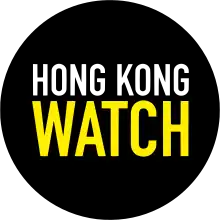Hong Kong Watch
Hong Kong Watch is a non-governmental organisation (NGO) based in the United Kingdom that was established to monitor the conditions of human rights, freedoms and rule of law in Hong Kong. It was founded by British human rights activist Benedict Rogers on 11 December 2017, two months after he was barred from entering Hong Kong.
 | |
| Formation | December 11, 2017 |
|---|---|
| Founded at | United Kingdom |
| Purpose | Monitor and report developments in Hong Kong |
Official language | English |
Chairman of Trustees | Benedict Rogers |
Patrons | Sir Malcolm Rifkind Catherine West Lord Paddy Ashdown Lord David Alton Sir Geoffrey Nice Lord Chris Patten |
| Website | www |
History
In Hong Kong, the aftermath of the 2014 Hong Kong protests and Legislative Council oath-taking controversy saw the imprisonment of Hong Kong democracy activists and Benedict Rogers, a British human rights activist, intended to visit them privately. On 11 October 2017, Rogers was barred entry to Hong Kong.[1][2] He arrived at Hong Kong International Airport on a flight from Bangkok but was escorted away by immigration officials and placed on a flight back to Thailand. He had previously been warned by a contact in the Chinese embassy in London that he might be refused entry to Hong Kong.[3][4] Rogers, who lived in Hong Kong between 1997 and 2002, has criticised what Rogers says is Mainland China's increasing threat to democracy in Hong Kong and has campaigned against the imprisonment of pro-democracy activists Joshua Wong, Nathan Law and Alex Chow. British Foreign Secretary Boris Johnson demanded an explanation from the Hong Kong authorities and the Central Chinese government.[5] Hua Chunying, a spokeswoman for the Chinese Foreign Ministry, later responded that the move was within China's sovereignty and said: "Whether this person's trip to Hong Kong involved an intention to intervene in Hong Kong's internal affairs and judicial independence – he knows very well himself."[6]
The following day, Rogers announced he would form a non-governmental organization (NGO) to monitor the rule of law and human rights in Hong Kong. Hong Kong Watch was launched at a reception hosted in Speaker's House, House of Commons in the Parliament of the United Kingdom on 11 December 2017. It was established on grounds of the belief of the fact that under the Sino-British Joint Declaration, the United Kingdom has a moral and legal obligation to speak out.[7] By 2020, the leadership of Hong Kong Watch was working with human rights leaders such as Luke de Pulford to create the Inter-Parliamentary Alliance on China, a global pressure group, advocating for human rights in China, particularly with regards the Uyghur genocide and Democracy in Hong Kong.[8]
Mission
Hong Kong Watch was set up to provide independent, comprehensive analysis and thought leadership on freedom and human rights in Hong Kong.[7]
See also
References
- "UK 'concerned' as Hong Kong denies Benedict Rogers entry". BBC News. London. 11 October 2017. Retrieved 22 February 2018.
- Phillips, Tom; Haas, Benjamin (11 October 2017). "British Conservative party activist barred from entering Hong Kong". The Guardian. London. Retrieved 22 February 2018.
- "A British Conservative Party human rights activist was turned away from Hong Kong after threats from China". Business Insider. Retrieved 25 February 2018.
- Rogers, Benedict (12 October 2017). "Why the world must wake up to China's threat to freedom in Hong Kong | Benedict Rogers". the Guardian. Retrieved 25 February 2018.
- Connor, Neil (11 October 2017). "Boris Johnson demands 'urgent explanation' from China after activist barred from entering Hong Kong". The Telegraph. Retrieved 22 February 2018.
- Farley, Harry (12 October 2017). "Christian human rights activist barred from Hong Kong". Christian Today. Retrieved 22 February 2018.
- "About Us". Hong Kong Watch. Retrieved 25 February 2018.
- "Parliamentarians From Around the World Unite to Discuss the China Challenge". thediplomat.com. Retrieved 31 January 2021.